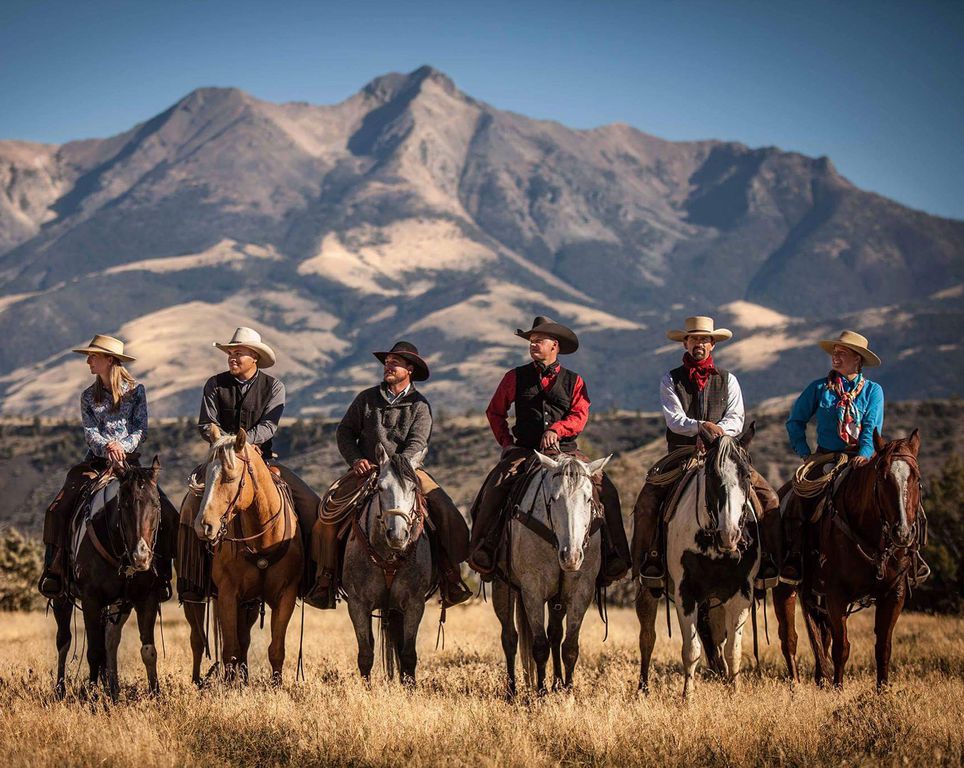
Work on a ranch encompasses a wide range of tasks and responsibilities associated with the operation and maintenance of a ranch, which is primarily engaged in raising and managing livestock, such as cattle, horses, or sheep, on an extensive area of land.
Ranch work plays a vital role in the agricultural sector, contributing significantly to food production and the preservation of rural communities. It involves various activities, including livestock herding, pasture management, fence maintenance, animal care, and equipment operation, often requiring extended hours and physical labor.
The main article will delve into the diverse aspects of ranch work, exploring its historical significance, modern practices, and the essential skills and knowledge required to thrive in this demanding yet rewarding field.
1. Noun
The connection between livestock and work on a ranch is fundamental and multifaceted. Livestock are the primary reason for the existence of ranches, and the work on a ranch revolves around caring for and managing these animals. Ranchers must have a deep understanding of animal husbandry, nutrition, and veterinary care to ensure the well-being and productivity of their livestock.
- Breeding and Genetics: Ranchers carefully select and breed their livestock to improve their genetics and produce animals with desirable traits, such as increased meat or milk production, better disease resistance, and adaptability to the ranch environment.
- Nutrition and Feeding: Livestock require a balanced diet to maintain their health and productivity. Ranchers must manage pastures and provide supplemental feed to ensure their animals have access to the nutrients they need.
- Veterinary Care: Ranchers work closely with veterinarians to prevent and treat diseases, injuries, and reproductive problems in their livestock. Regular vaccinations, deworming, and hoof care are essential for maintaining animal health.
- Marketing and Sales: Ranchers must market and sell their livestock to generate income. This involves understanding market trends, negotiating prices, and finding buyers who value the quality of their animals.
In summary, livestock is the heart of a ranch, and work on a ranch is centered around providing the best possible care and management for these animals. Ranchers must possess a diverse skill set and a deep commitment to their livestock to succeed in this demanding but rewarding profession.
2. Verb
Herding is an essential component of work on a ranch, as it directly relates to the care and management of livestock. Ranchers must move and manage their livestock across vast grazing lands to ensure their well-being and grazing efficiency. This involves:
- Monitoring livestock movement: Ranchers regularly observe their livestock to ensure they are healthy, grazing properly, and not straying too far from the desired grazing area.
- Managing pasture rotation: Ranchers rotate their livestock between different pastures to prevent overgrazing and to allow pastures to recover and regenerate.
- Controlling predators: Ranchers take measures to protect their livestock from predators, such as wolves, coyotes, and bears, which can cause significant losses.
- Providing water and shelter: Ranchers ensure that their livestock have access to clean water and shelter from the elements, especially during extreme weather conditions.
Effective herding practices are crucial for the success of a ranch. Well-managed livestock are healthier, more productive, and less likely to stray or be lost. Herding also helps ranchers maintain the health and productivity of their grazing lands, ensuring the long-term sustainability of their operations.
In summary, herding is a fundamental aspect of work on a ranch, directly related to the care and management of livestock. Ranchers must possess a deep understanding of animal behavior, grazing management, and predator control to effectively herd their livestock and ensure the success and sustainability of their ranching operations.
3. Adjective
The physical demands of ranch work are undeniable, shaping many aspects of a rancher’s life. From the daily tasks of feeding and caring for livestock to the strenuous labor of fence repair and equipment handling, physical strength and endurance are essential attributes for success on a ranch.
- Sustained Physical Exertion: Ranch work involves long hours of sustained physical exertion, often in challenging weather conditions. Ranchers may spend hours on horseback, herding cattle across vast pastures, or engage in physically demanding tasks such as branding, castrating, and vaccinating livestock.
- Heavy Lifting and Equipment Handling: Ranchers frequently lift heavy objects, such as hay bales, feed bags, and equipment, and operate heavy machinery, including tractors, , and ATVs. Proper technique and physical strength are crucial to prevent injuries and ensure the safe handling of equipment.
- Fence Repair and Maintenance: Maintaining miles of fencing is a critical task on a ranch. Ranchers must be able to repair and replace fence posts, barbed wire, and gates, often in rugged terrain and under adverse weather conditions.
- Livestock Management: Handling livestock can be physically demanding, especially during procedures such as sorting, loading, and treating animals. Ranchers must be able to restrain and move livestock safely and effectively.
The physical demands of ranch work extend beyond the specific tasks mentioned above. Ranchers must be able to withstand long hours in the saddle, endure extreme temperatures, and navigate challenging terrain. Physical fitness and a strong work ethic are essential for success in this demanding profession.
4. Adverb
Diligence is a cornerstone of success on a ranch, where ranchers must consistently apply themselves with dedication and meticulous care to thrive in this demanding profession.
- Unwavering Commitment: Ranchers are unwavering in their commitment to their work, dedicating long hours and sacrificing personal time to ensure the well-being of their livestock and the success of their operations.
- Attention to Detail: Every aspect of ranch work requires meticulous attention to detail, from monitoring animal health to managing pastures and maintaining equipment. Ranchers must be observant and thorough in their approach to ensure nothing is overlooked.
- Adaptability and Problem-Solving: Ranch work is unpredictable, and ranchers must be adaptable and resourceful in the face of challenges. They must quickly assess situations, make sound decisions, and implement effective solutions.
- Pride and Passion: Ranchers take immense pride in their work, treating their animals and land with respect and dedication. This passion drives them to go the extra mile and strive for excellence in all that they do.
The diligent nature of ranch work extends beyond the physical tasks and encompasses a deep commitment to the land, livestock, and the legacy of ranching. Ranchers are stewards of their environment and play a vital role in preserving rural communities and traditions.
5. Preposition
Collaboration and teamwork are essential components of successful ranch work. Ranchers rely heavily on cooperative relationships with each other and with external partners to accomplish the diverse tasks and responsibilities involved in ranch operations.
Ranchers frequently collaborate with neighboring ranchers to share resources, equipment, and expertise. They may form cooperative agreements for grazing management, livestock marketing, and disaster response. By working together, ranchers can overcome challenges, improve efficiency, and reduce costs.
External partnerships are also crucial for ranch work. Ranchers work closely with veterinarians to ensure the health and well-being of their livestock. They consult with suppliers for equipment, feed, and other necessary goods and services. These partnerships allow ranchers to access specialized knowledge and resources, enabling them to operate their ranches effectively.
In summary, the preposition “with” highlights the collaborative nature of ranch work, emphasizing the importance of teamwork, cooperation, and . Ranchers rely on strong relationships with each other and with external partners to succeed in this demanding profession.
FAQs on Work on a Ranch
This section addresses common questions and misconceptions surrounding work on a ranch, providing informative answers to enhance understanding of this demanding profession.
Question 1: What are the primary tasks involved in ranch work?
Ranch work encompasses a wide range of responsibilities, including livestock care and management, pasture maintenance, fence repair, equipment operation, and administrative duties. Ranchers must possess a diverse skill set to effectively handle the multifaceted aspects of ranch operations.
Question 2: Is ranch work physically demanding?
Yes, ranch work often demands physical strength and endurance. Ranchers engage in strenuous activities such as herding livestock, repairing fences, and operating heavy machinery. Physical fitness and a strong work ethic are essential attributes for success in this profession.
Question 3: What educational background is required for ranch work?
While formal education is not always a requirement, many ranchers have backgrounds in agriculture, animal science, or related fields. Practical experience and a deep understanding of livestock management, grazing practices, and ranch operations are highly valued in this profession.
Question 4: What are the career prospects for ranch workers?
Ranch workers can advance to supervisory roles, such as ranch manager or foreman, with experience and proven leadership abilities. Some ranchers may also pursue careers in related fields, such as livestock marketing, agricultural consulting, or land management.
Question 5: How does ranch work contribute to the agricultural industry?
Ranch work plays a vital role in the agricultural industry by providing a significant portion of the world’s food supply. Ranchers raise livestock for meat, milk, and other products, contributing to food security and economic stability.
Question 6: What are the challenges faced by ranchers?
Ranchers face various challenges, including fluctuating market prices, extreme weather conditions, and changing consumer preferences. Additionally, managing large herds of livestock and vast tracts of land requires significant time, effort, and resources.
Summary: Work on a ranch is a demanding profession that requires physical strength, dedication, and a deep understanding of livestock management and ranch operations. Ranchers play a crucial role in the agricultural industry and face unique challenges in their daily work.
Transition: The following section will delve into the historical significance and modern practices of ranch work, providing further insights into this fascinating field.
Tips for Work on a Ranch
Ranch work is a physically demanding and complex profession. Here are some essential tips for individuals interested in pursuing a career in this field:
Tip 1: Develop a Strong Work Ethic
Ranch work requires long hours,, and dedication. Candidates should be highly motivated and willing to commit to the demanding schedule of a rancher.
Tip 2: Acquire Practical Skills
Hands-on experience is invaluable in ranch work. Seek opportunities to assist experienced ranchers with tasks such as livestock handling, pasture management, and equipment operation.
Tip 3: Learn Animal Husbandry
A thorough understanding of animal husbandry is critical. Study livestock breeds, nutrition, and health management to ensure the well-being of the animals.
Tip 4: Develop Horsemanship Skills
Horses are essential partners on a ranch. Develop strong horsemanship skills, including riding, handling, and training, to effectively manage livestock.
Tip 5: Embrace Technology
Technology can enhance efficiency in ranch operations. Learn to use GPS systems, electronic ear tags, and other tools to improve livestock management and decision-making.
Tip 6: Network and Collaborate
Establish relationships with neighboring ranchers, industry professionals, and suppliers. Collaboration and sharing of knowledge can greatly benefit ranch operations.
Summary: By following these tips, aspiring ranchers can increase their chances of success in this challenging but rewarding field. Hard work, practical skills, and a commitment to animal welfare are essential qualities for thriving in ranch work.
Transition: The following section of this article will explore the diverse aspects of ranch life and the unique challenges and opportunities it presents.
Conclusion
Work on a ranch encompasses a physically demanding and multifaceted profession that plays a crucial role in the agricultural industry. Ranchers are responsible for the care and management of livestock, as well as the maintenance and improvement of vast grazing lands.
This article has explored the diverse aspects of ranch work, from the daily tasks and responsibilities to the challenges and opportunities it presents. Whether it’s herding cattle across vast pastures, repairing fences, or marketing livestock, ranch work requires a deep understanding of animal husbandry, land management, and business operations.
As the world continues to face challenges such as population growth and climate change, the role of ranchers in providing food and preserving natural resources becomes increasingly significant. The dedication and hard work of ranchers ensure the sustainability of our food systems and the well-being of our planet.



